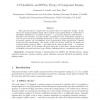Free Online Productivity Tools
i2Speak
i2Symbol
i2OCR
iTex2Img
iWeb2Print
iWeb2Shot
i2Type
iPdf2Split
iPdf2Merge
i2Bopomofo
i2Arabic
i2Style
i2Image
i2PDF
iLatex2Rtf
Sci2ools
CORR
2010
Springer
2010
Springer
A probabilistic and RIPless theory of compressed sensing
This paper introduces a simple and very general theory of compressive sensing. In this theory, the sensing mechanism simply selects sensing vectors independently at random from a probability distribution F; it includes all models -- e.g. Gaussian, frequency measurements -discussed in the literature, but also provides a framework for new measurement strategies as well. We prove that if the probability distribution F obeys a simple incoherence property and an isotropy property, one can faithfully recover approximately sparse signals from a minimal number of noisy measurements. The novelty is that our recovery results do not require the restricted isometry property (RIP) -- they make use of a much weaker notion -- or a random model for the signal. As an example, the paper shows that a signal with s nonzero entries can be faithfully recovered from about slog n Fourier coefficients that are contaminated with noise. Keywords. Compressed sensing, 1 minimization, the LASSO, the Dantzig select...
| Added | 09 Dec 2010 |
| Updated | 09 Dec 2010 |
| Type | Journal |
| Year | 2010 |
| Where | CORR |
| Authors | Emmanuel J. Candès, Yaniv Plan |
Comments (0)

